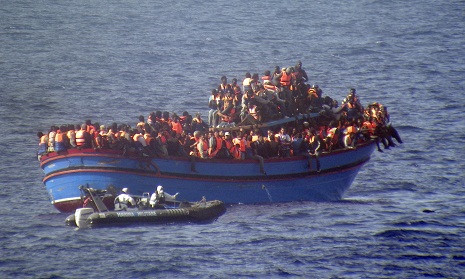“It is time to bring back the search-and-rescue capacity of the Mare Nostrum operation, this time as a collective European effort,” said Jan Egeland, a former UN head of humanitarian affairs and emergency relief coordinator, and now secretary general of the Norwegian Refugee Council. “The Mediterranean is now the world’s most dangerous border between countries at peace. European nations have completely run out of excuses. They have to act now in order to prevent even bigger tragedies than those we have already witnessed.”
Michael Diedring, the secretary general of the European Council on Refugees and Exiles, said: “Our calls for EU search-and-rescue efforts in the Mediterranean have fallen on deaf ears. Apart from the outstanding efforts of the Italian navy, the EU continues to fail to act.”
The Triton operation is run by Frontex, the EU’s border management agency, with a monthly budget of €2.9m (£2.1m), less than a third of what was spent on Mare Nostrum.
Migrants can`t be left to die in the seas of Europe
Patrick Kingsley in Tripoli
Read more
“Operation Triton and Mare Nostrum are two very different operations: the first was run by the Italian navy and was taking place close to Libya. Operation Triton is run by Frontex, whose mandate focuses on border control. This is why our operation takes place closer to the Italian coasts,” said Izabella Cooper, a spokeswoman for Frontex. “Because of the different mandate, Operation Triton was never intended to replace Mare Nostrum.”
Cooper added: “While our primary focus is border control, saving lives is an absolute priority. Since the beginning of 2015 about 18,000 migrants arrived in Italy of which 16,000 were rescued during in search-and-rescue operations. Out of these over 5,000 – a third of the total – were rescued by Frontex vessels in Triton.”
She said the vast majority of Triton search-and-rescue operations actually took place far from the Italian coastal area and very close to Libya.
By comparison, the Italian Mare Nostrum operation rescued 100,000 shipwrecked migrants over its year-long existence.
The European commission has drawn up a broad policy document, the European Agenda on Migration, due to be presented to member states next month. It is aimed at establishing a concerted European asylum policy and more clearly defining conditions for legal migration, while formulating “a clear plan to fight smuggling and trafficking of migrants and an effective return policy”.
Human Rights Watch warned that some of the proposals being circulated, including the possible establishment of offshore processing centres in north African countries, as well as outsourcing border control and rescue operations in order to prevent departures, raised human rights concerns.
“It’s hard not to see these proposals as cynical bids to limit the numbers of migrants and asylum seekers making it to EU shores,” said Judith Sunderland, HRW’s acting deputy Europe and central Asia director. “Whatever longer-term initiatives may come forth, the immediate humanitarian imperative for the EU is to get out there and save lives.”
The British charity Save the Children said it would launch a campaign on Thursday calling on British political parties to press for search-and-rescue operations to be included in the European agenda on migration, and “develop a long-term plan to tackle the drivers of children on the move and ensure these children are protected.”
Justin Forsyth, the head of the charity, said: “Our political leaders cannot ignore the fact that without search and rescue we are allowing thousands of innocent children and their families to drown off the coast of Europe.
“Whoever makes up the next government has a moral obligation to work with the EU to restart the rescue. Every migrant child’s death is a stain on Europe’s conscience. How many thousands must die this summer before Europe acts?”
More about:
















































